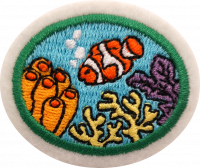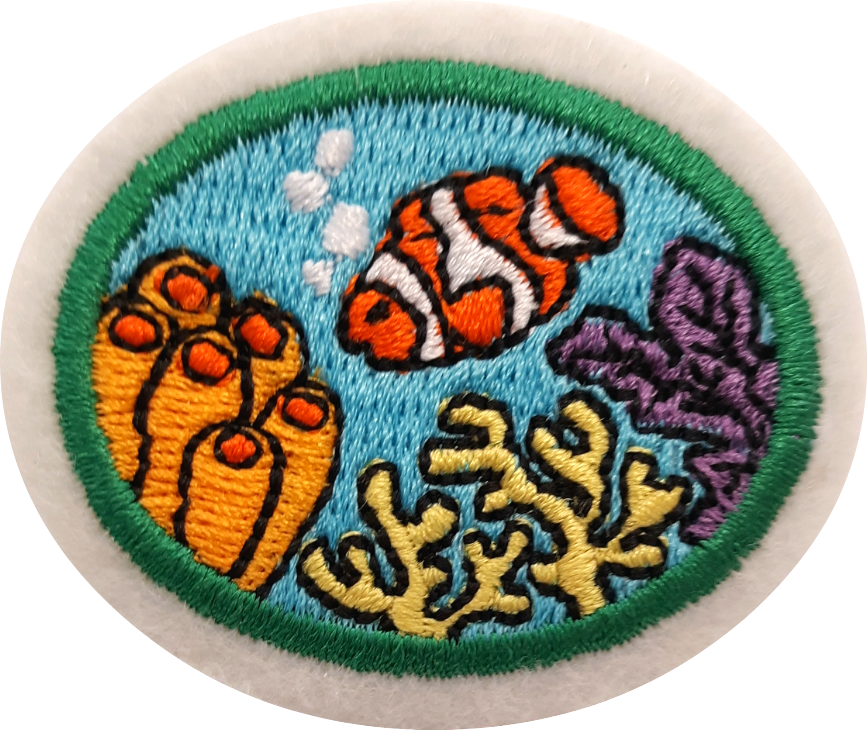Difference between revisions of "AY Honors/Coral Reefs/Requirements"
Jomegat bot (talk | contribs) m (Jomegat bot moved page AY Honor Coral Reefs Requirements to AY Honor Coral Reefs Requirements: Bot: Moved page) |
m |
||
| (8 intermediate revisions by 2 users not shown) | |||
| Line 1: | Line 1: | ||
| − | + | {{HonorSubpage}} | |
| − | |||
| − | |||
| − | + | <section begin=Body /> | |
| − | |||
| − | <b> | + | <b>1. <section begin=req1 /><noinclude><translate><!--T:1--> |
| − | < | + | </noinclude>What is a reef? Identify two types of "building blocks" of reefs. |
| + | <noinclude></translate></noinclude><section end=req1 /></b> | ||
| − | + | <b>2. <section begin=req2 /><noinclude><translate><!--T:2--> | |
| − | < | + | </noinclude>Answer the following: |
| + | <noinclude></translate></noinclude><section end=req2 /></b> | ||
| − | :<b> | + | :<b>a. <section begin=req2a /><noinclude><translate><!--T:3--> |
| − | <section end= | + | </noinclude>Is coral a plant or animal? |
| + | <noinclude></translate></noinclude><section end=req2a /></b> | ||
| − | :<b> | + | :<b>b. <section begin=req2b /><noinclude><translate><!--T:4--> |
| − | <section end= | + | </noinclude>In what phylum is coral categorized? |
| + | <noinclude></translate></noinclude><section end=req2b /></b> | ||
| − | :<b> | + | :<b>c. <section begin=req2c /><noinclude><translate><!--T:5--> |
| − | < | + | </noinclude>What part of a coral reef is living? |
| + | <noinclude></translate></noinclude><section end=req2c /></b> | ||
| − | <b> | + | :<b>d. <section begin=req2d /><noinclude><translate><!--T:6--> |
| − | <section end= | + | </noinclude>Distinguish between soft and hard corals. |
| + | <noinclude></translate></noinclude><section end=req2d /></b> | ||
| − | <b> | + | <b>3. <section begin=req3 /><noinclude><translate><!--T:7--> |
| − | <section end= | + | </noinclude>Where are coral reefs found? Describe the conditions that are needed for healthy coral growth. |
| + | <noinclude></translate></noinclude><section end=req3 /></b> | ||
| − | + | <b>4. <section begin=req4 /><noinclude><translate><!--T:8--> | |
| − | < | + | </noinclude>Describe and/or draw a diagram showing at least three different types of coral reefs. |
| + | <noinclude></translate></noinclude><section end=req4 /></b> | ||
| − | :<b> | + | :<b>a. <section begin=req4a /><noinclude><translate><!--T:9--> |
| − | <section end= | + | </noinclude>Fringing Reefs |
| + | <noinclude></translate></noinclude><section end=req4a /></b> | ||
| − | :<b> | + | :<b>b. <section begin=req4b /><noinclude><translate><!--T:10--> |
| − | < | + | </noinclude>Barrier Reefs |
| + | <noinclude></translate></noinclude><section end=req4b /></b> | ||
| − | :<b> | + | :<b>c. <section begin=req4c /><noinclude><translate><!--T:11--> |
| − | < | + | </noinclude>Atolls |
| + | <noinclude></translate></noinclude><section end=req4c /></b> | ||
| − | <b> | + | :<b>d. <section begin=req4d /><noinclude><translate><!--T:12--> |
| − | < | + | </noinclude>Patch Reef |
| + | <noinclude></translate></noinclude><section end=req4d /></b> | ||
| − | <b> | + | <b>5. <section begin=req5 /><noinclude><translate><!--T:13--> |
| − | < | + | </noinclude>Define zooxanthellae. |
| + | <noinclude></translate></noinclude><section end=req5 /></b> | ||
| − | + | <b>6. <section begin=req6 /><noinclude><translate><!--T:14--> | |
| − | < | + | </noinclude>Answer the following questions about how corals get their food: |
| + | <noinclude></translate></noinclude><section end=req6 /></b> | ||
| − | :<b> | + | :<b>a. <section begin=req6a /><noinclude><translate><!--T:15--> |
| − | <section end= | + | </noinclude>Which type of feeding primarily occurs at night and why does this result in clear water? |
| + | <noinclude></translate></noinclude><section end=req6a /></b> | ||
| − | :<b> | + | :<b>b. <section begin=req6b /><noinclude><translate><!--T:16--> |
| − | < | + | </noinclude>Which type of feeding occurs primarily during daylight hours |
| + | <noinclude></translate></noinclude><section end=req6b /></b> | ||
| − | <b> | + | :<b>c. <section begin=req6c /><noinclude><translate><!--T:17--> |
| − | <section end= | + | </noinclude>Why are coral reefs found in clear water? |
| + | <noinclude></translate></noinclude><section end=req6c /></b> | ||
| − | <b> | + | <b>7. <section begin=req7 /><noinclude><translate><!--T:18--> |
| − | <section end= | + | </noinclude>Identify five corals that can be found on a reef. |
| + | <noinclude></translate></noinclude><section end=req7 /></b> | ||
| − | <b> | + | <b>8. <section begin=req8 /><noinclude><translate><!--T:19--> |
| − | <section end= | + | </noinclude>Identify ten fish that live in a coral reef. |
| + | <noinclude></translate></noinclude><section end=req8 /></b> | ||
| − | <b> | + | <b>9. <section begin=req9 /><noinclude><translate><!--T:20--> |
| − | <section end= | + | </noinclude>Identify five species of non-coral invertebrates that might live on a reef. |
| + | <noinclude></translate></noinclude><section end=req9 /></b> | ||
| − | <b> | + | <b>10. <section begin=req10 /><noinclude><translate><!--T:21--> |
| − | <section end= | + | </noinclude>Define "bleaching" as it pertains to corals, and explore the impact this has on the reef. |
| + | <noinclude></translate></noinclude><section end=req10 /></b> | ||
| − | <b> | + | <b>11. <section begin=req11 /><noinclude><translate><!--T:22--> |
| − | <section end= | + | </noinclude>Identify at least one invasive species and how it affects reefs. |
| + | <noinclude></translate></noinclude><section end=req11 /></b> | ||
| − | <b> | + | <b>12. <section begin=req12 /><noinclude><translate><!--T:23--> |
| − | <section end= | + | </noinclude>Why are reefs an important community? List at least three ways that you can help protect a reef. |
| + | <noinclude></translate></noinclude><section end=req12 /></b> | ||
| − | <b> | + | <b>13. <section begin=req13 /><noinclude><translate><!--T:24--> |
| − | < | + | </noinclude>Prepare an object lesson about an animal that lives in the reef. Present this lesson at a club worship or similar function. Be sure to include a Bible text in this presentation. |
| + | <noinclude></translate></noinclude><section end=req13 /></b> | ||
| − | + | <section begin=challenge /> | |
| − | < | + | <b>14. <section begin=req14 /><noinclude><translate><!--T:25--> |
| + | </noinclude>Do at least two of the following: | ||
| + | <noinclude></translate></noinclude><section end=req14 /></b> | ||
| − | :<b> | + | :<b>a. <section begin=req14a /><noinclude><translate><!--T:26--> |
| − | <section end= | + | </noinclude>Visit an aquarium which exhibits reef species. |
| + | <noinclude></translate></noinclude><section end=req14a /></b> | ||
| − | :<b> | + | :<b>b. <section begin=req14b /><noinclude><translate><!--T:27--> |
| − | <section end= | + | </noinclude>Make a collection of at least five species of dead coral you find washed up on a beach or fossil corals. Make sure you obey local laws about collecting. |
| + | <noinclude></translate></noinclude><section end=req14b /></b> | ||
| − | :<b> | + | :<b>c. <section begin=req14c /><noinclude><translate><!--T:28--> |
| − | <section end= | + | </noinclude>Watch a presentation about reefs. Summarize what you learned about coral reefs. |
| + | <noinclude></translate></noinclude><section end=req14c /></b> | ||
| − | :<b> | + | :<b>d. <section begin=req14d /><noinclude><translate><!--T:29--> |
| − | <section end= | + | </noinclude>Draw or paint a picture of a reef community with at least ten species. |
| + | <noinclude></translate></noinclude><section end=req14d /></b> | ||
| − | :<b> | + | :<b>e. <section begin=req14e /><noinclude><translate><!--T:30--> |
| − | <section end= | + | </noinclude>As a group, make a short video about a reef conservation project. Explain why this specific habitat should be saved. |
| + | <noinclude></translate></noinclude><section end=req14e /></b> | ||
| − | :<b> | + | :<b>f. <section begin=req14f /><noinclude><translate><!--T:31--> |
| − | <section end= | + | </noinclude>Create a 3D diorama of a coral community. |
| + | <noinclude></translate></noinclude><section end=req14f /></b> | ||
| − | + | :<b>g. <section begin=req14g /><noinclude><translate><!--T:32--> | |
| − | + | </noinclude>A similar project approved by your instructor. | |
| + | <noinclude></translate></noinclude><section end=req14g /></b> | ||
| + | <section end=challenge /> | ||
| + | |||
| + | <section end=Body /> | ||
Latest revision as of 16:53, 3 January 2023
1. What is a reef? Identify two types of "building blocks" of reefs.
2. Answer the following:
- a. Is coral a plant or animal?
- b. In what phylum is coral categorized?
- c. What part of a coral reef is living?
- d. Distinguish between soft and hard corals.
3. Where are coral reefs found? Describe the conditions that are needed for healthy coral growth.
4. Describe and/or draw a diagram showing at least three different types of coral reefs.
- a. Fringing Reefs
- b. Barrier Reefs
- c. Atolls
- d. Patch Reef
5. Define zooxanthellae.
6. Answer the following questions about how corals get their food:
- a. Which type of feeding primarily occurs at night and why does this result in clear water?
- b. Which type of feeding occurs primarily during daylight hours
- c. Why are coral reefs found in clear water?
7. Identify five corals that can be found on a reef.
8. Identify ten fish that live in a coral reef.
9. Identify five species of non-coral invertebrates that might live on a reef.
10. Define "bleaching" as it pertains to corals, and explore the impact this has on the reef.
11. Identify at least one invasive species and how it affects reefs.
12. Why are reefs an important community? List at least three ways that you can help protect a reef.
13. Prepare an object lesson about an animal that lives in the reef. Present this lesson at a club worship or similar function. Be sure to include a Bible text in this presentation.
14. Do at least two of the following:
- a. Visit an aquarium which exhibits reef species.
- b. Make a collection of at least five species of dead coral you find washed up on a beach or fossil corals. Make sure you obey local laws about collecting.
- c. Watch a presentation about reefs. Summarize what you learned about coral reefs.
- d. Draw or paint a picture of a reef community with at least ten species.
- e. As a group, make a short video about a reef conservation project. Explain why this specific habitat should be saved.
- f. Create a 3D diorama of a coral community.
- g. A similar project approved by your instructor.


